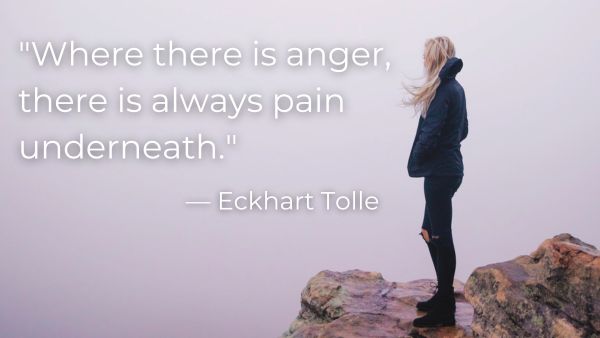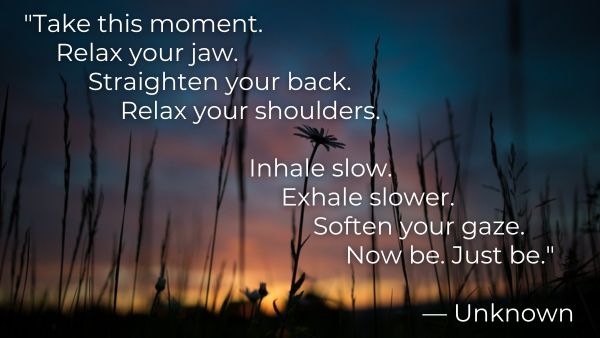What do you picture when you think of someone who is struggling with anxiety? Someone who is clearly nervous or scared? Someone either trying to flee the scene or freezing up when they are overwhelmed?
For most people, this is exactly what they imagine when they think of anxiety.
That is, they tend to think about the flight or freeze parts of the fight, flight, or freeze response.
What most people don’t really consider is the fight part of the fight, flight or freeze response. You don’t usually picture someone who is anxious as irritable, angry, or even downright aggressive.
Table of Contents

What Does Anxious Angry Look Like?
The reality is, a LOT of people with anxiety don’t look scared. They look MAD.
Have you ever snapped at your roommate for forgetting to take the trash out and then realized that the real reason you’re so angry is that you’re actually super stressed? Or have you ever been beyond irritated at your partner for going out of town at the last minute and then realized that you’re actually anxious that something bad might happen to them?
Anxiety is not always immediately obvious in these situations, to others or yourself.
Here are some ways that anxious anger can show up:
- Getting angry with yourself when you are struggling with something you feel like you “shouldn’t” be anxious about
- Getting angry with a loved one when they put you in a situation which makes you feel anxious or ask you to do something you’ve found anxiety-provoking in the past
- Getting angry with someone about something completely unrelated because you are already feeling anxious about something else
- Getting angry with your anxiety for getting in your way (which is not always a bad thing, as this can motivate us to make positive changes)
No matter what the situation, identifying the anxiety for what it is, will be your first step.

Why Do People Get Anxious Angry?
Anger is considered a secondary emotion. This means that often times underneath anger is a lot of other emotions, like hurt, fear, overwhelm, embarrassment, etc. Anger is just the tip of the emotional iceberg.
Anger is like a bodyguard. Anger comes out when it doesn’t feel safe to express those other emotions. Because it can feel a lot easier to get MAD, then to tell someone that they hurt your feelings or that you’re feeling scared.
Getting anxious angry is completely natural when you think about it. It doesn’t make sense to respond to every genuine danger by running away or freezing up. In some cases, the most helpful response is to fight back.
This is just another way that anxiety can show up for people.
The issue is that in modern day society, when anxiety is setting off a false alarm and telling your brain there is a real danger even when there isn’t, this protective response can look like lashing out at your loved ones. It can look like snapping at your kids. It can look like being grumpy even when you have no real reason to be.
Who Gets Anxious Angry?
Getting anxious angry is much more common than most people realize.
As an anxiety therapist, I see many of my clients experience anxious anger, and I’ve found that this can be a revelation for them to realize what is really going on.
Often, my client’s family members think that they are irritable or angry with them, when really they are struggling with anxiety in that moment.
The truth is, anyone can get anxious angry. Some individuals with anxiety may just tend more towards this response than others.
What to Do About Getting Anxious Angry
The first step is recognizing what emotion(s) you are feeling underneath your anger. Do a quick check-in with yourself and notice what you are experiencing in that moment, both situationally and internally, and see what jumps out at you.
If you can identify what you are really feeling, then this sets you up to cope with your emotions more effectively.
When the underlying emotion is anxiety, it will be most effective to work through your anxiety rather than focus on the anger, as the anger is a symptom of your anxiety in this case.
There are plenty of self-help resources out there if you’re looking to go the DIY route. Having the support of a therapist who is trained in the treatment of anxiety can also be incredibly helpful.
If you have questions about anxiety treatment or anxious anger, feel free to reach out!

As a reminder, this blog post is not intended as professional counseling or clinical advice. This article is meant to provide you with some helpful information about getting anxious angry. If you are struggling with your mental health, I encourage you to consider reaching out for additional support, professional or otherwise.

-Kristel Roper, LMFT, LPCC
Kristel Roper is a licensed psychotherapist offering therapy services to individuals in the Sacramento area. She specializes in therapy for anxiety and OCD and especially enjoys working with young women as they navigate the challenges of relationships, college, career, and beyond. If you have a question for Kristel or are interested in therapy for yourself or your loved one, feel free to reach out.
Photo by Mitchell Hartley on Unsplash
